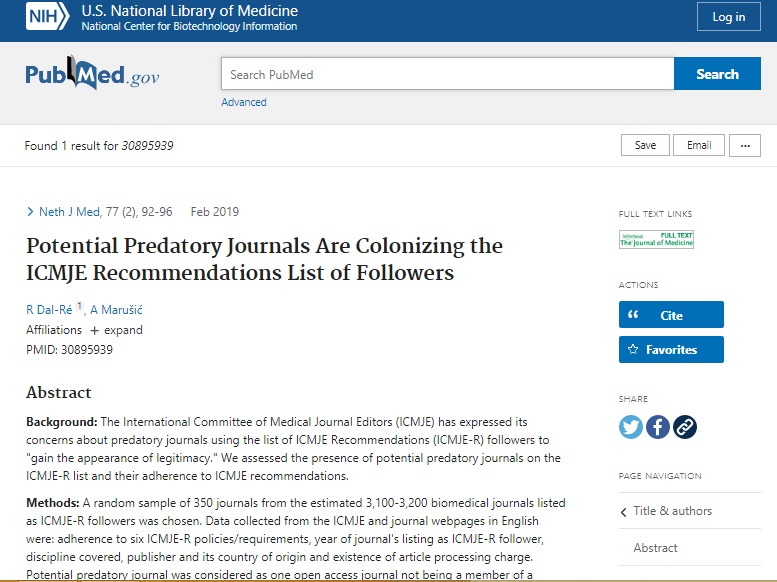Potential predatory journals are colonizing the ICMJE recommendations list of followers.
R Dal-Ré, A Marušić.
Neth J Med. 2019;77(2):92–96.
Link: http://www.njmonline.nl/getpdf.php?id=2093 ; PMID: 30895939.
Recently several predatory journals seem to claim that they follow all the ICMJE (The International Committee of Medical Journal Editors) recommendations to gain the appearance of legitimacy.
The term ‘predatory journals’ could be assumed, that these are open access journals that publish poor quality articles, with poor or no peer-review process, owned by publishers providing no transparent editorial services. Their main objective is financial gain by article processing charges to authors.
In this paper, the authors picked a random 350 titles and checked them.
Following were the findings:
31% appeared to be predatory journals.
94% were included in the ICJME-R list of followers in the last four years.
Number of followers increased by 120% from 15 (2014) to 33 (2017).
Half (54/108) were published by publishers in the USA and 62% (67/108) were devoted to medicine.
Adherence to five of the main policies and requirements considered was scarce, ranging from 51% (plagiarism) to 7% (trial registration).
The policy on authors’ conflicts of interest was the only commonly (72%) mentioned policy.
Although most predatory journals are located in developing countries, notably India and Turkey, many are edited in the USA and other western countries.
The use of predatory journals has spread all over the world: researchers from 146 countries (out of 193 countries belonging to United Nations) have published in predatory journals.
A comparison between American and Indian journals was done which showed, Authorship policies (or instructions) were significantly more present in journals with publishers from India than from USA, with no differences in the other five policies and requirements.
Author’s conclusion:
Publishing in predatory journals is unethical.
Investigators must know how to distinguish scholarly journals from predatory journals.
Potential predatory journals on the list of ICMJE-R followers do not provide public evidence that they actually adhere to ICMJE-R, so it is questionable whether ICMJE should keep this list. They should be deleted from the ICMJE-R list of followers to prevent misleading authors.



